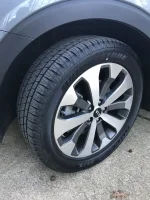If you are shopping for tires you may want to look carefully at the quote. Some places add in a TPMS kit and labor automatically for cars with a TPMS system. I don't think this is necessary on new vehicles still covered under warranty. You may want to consider removing to save yourself ~$40-50. Also some newer vehicles with automated driving capabilities have a second type of tire mounted sensor. I discovered the Telluride is not one of these vehicles, so don't get suckered into the other sensor.
If my information is incorrect or misleading, please feel free to reply so we can get the right information into the forum.
If my information is incorrect or misleading, please feel free to reply so we can get the right information into the forum.





